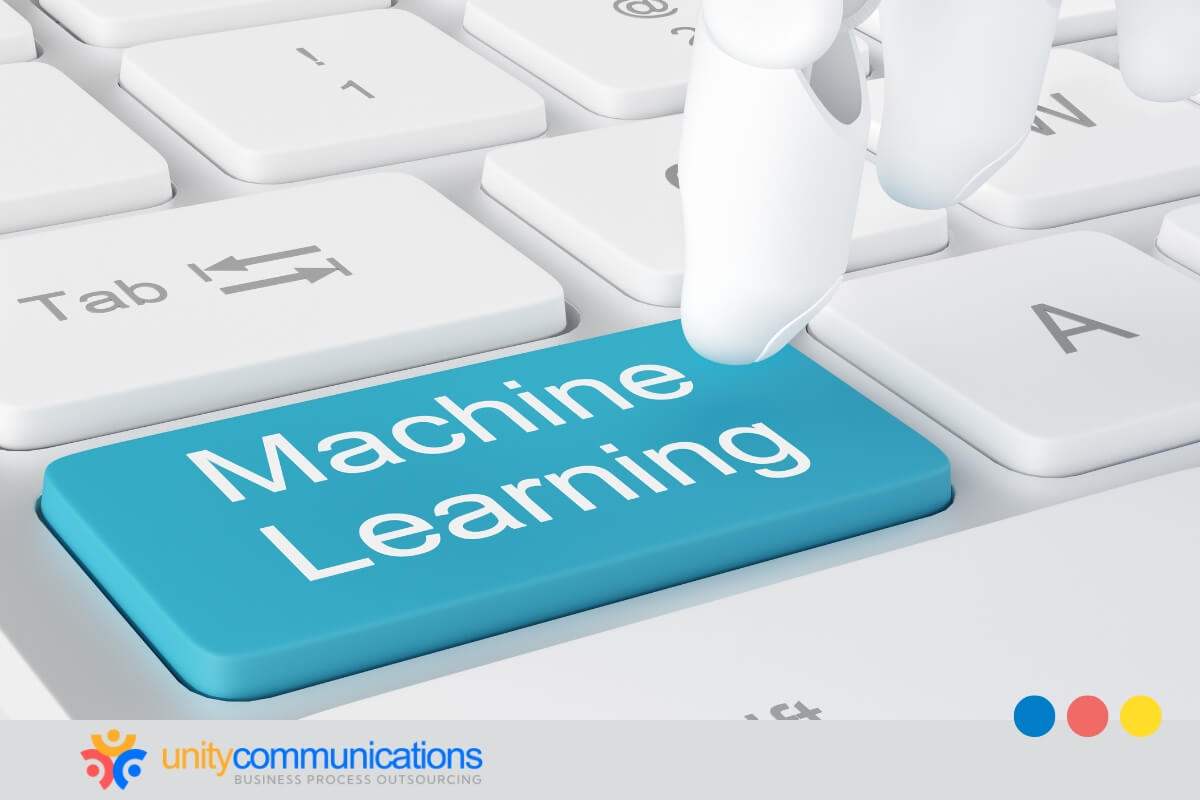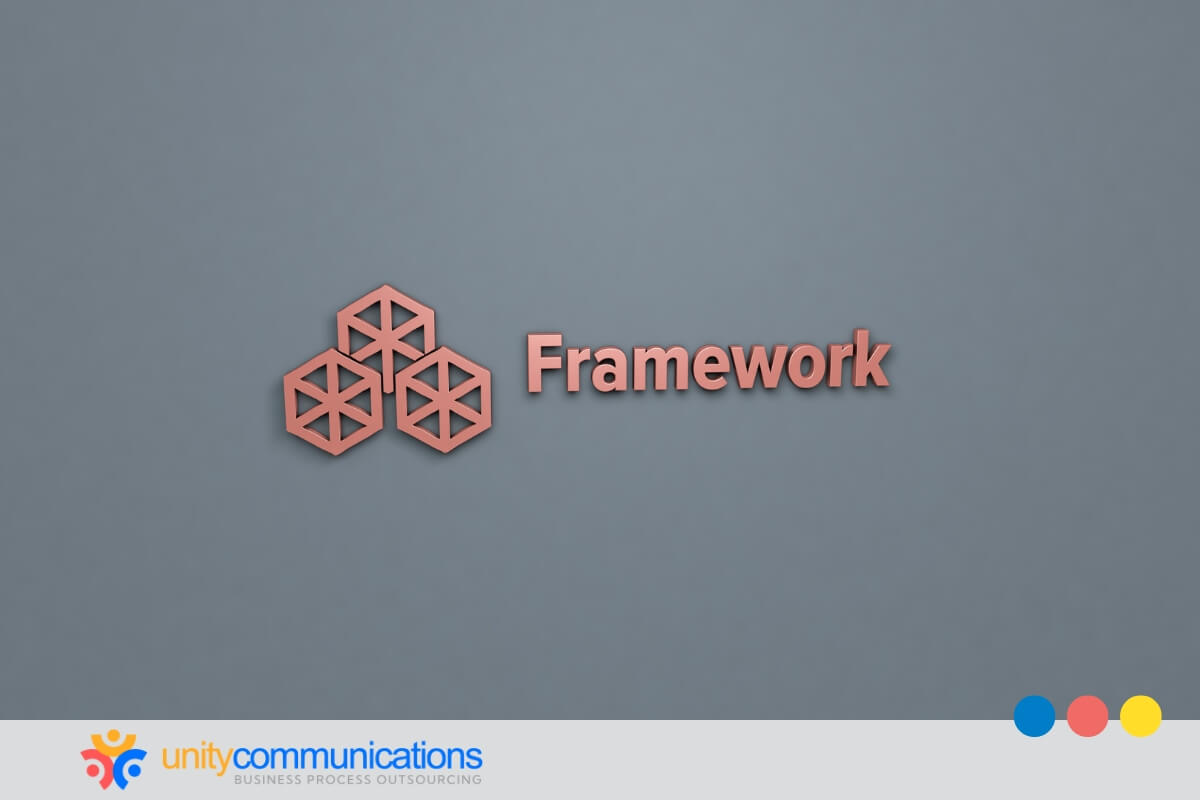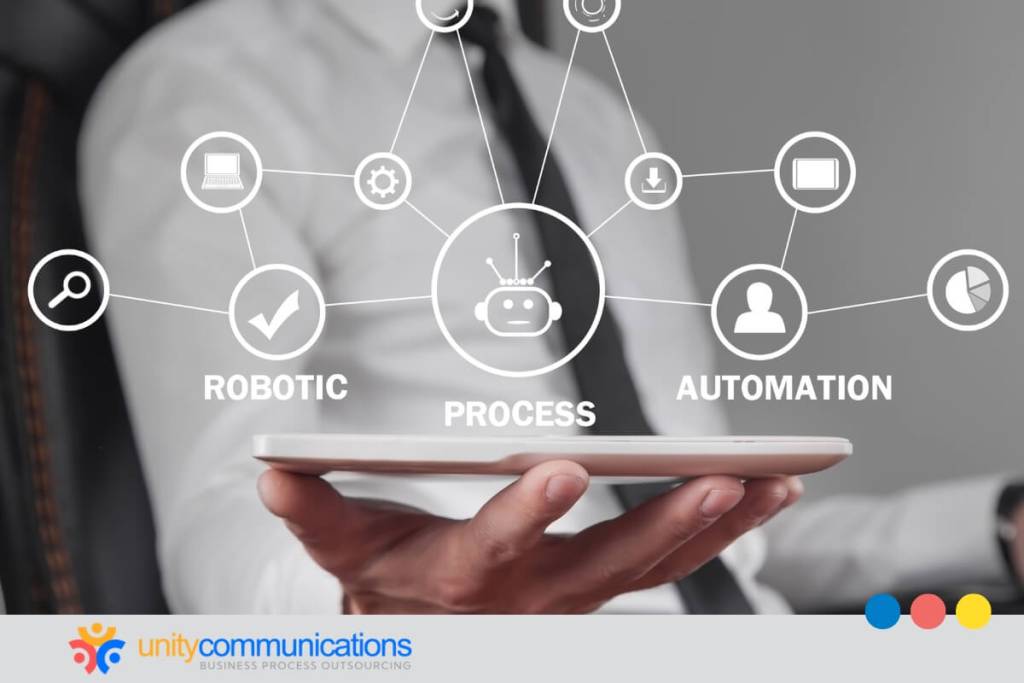Table of Contents
Global capability centers (GCCs) are transforming how companies use robotic process automation (RPA) to scale operations. These centralized teams help your business handle repetitive tasks faster and at a lower cost.
Traditionally, business process outsourcing (BPO) relied on manual labor to save money. But today’s automation-first models are changing that. GCCs bring structure, expertise, and integrated tech stacks that power RPA adoption across regions.
This article explores how RPA services outsourced to GCCs help you stay competitive through speed, consistency, and smarter execution. Read on to learn more!
Why GCC-led RPA drives efficiency, scale, and innovation

RPA fits naturally into GCC operations. Both are built for structure, precision, and repeatability. These core traits streamline business execution at scale.
This alignment also reflects how automation reshapes BPO. By definition, business process outsourcing involves offloading repetitive, rules-based tasks to third parties. Traditionally, it leaned heavily on manual labor to reduce costs. Automation now offers a more agile, consistent, and scalable alternative.
GCCs follow standardized workflows and audit-ready processes, making them ideal hubs for centralized automation. RPA allows these centers to deliver high-volume tasks more accurately and quickly without disrupting business continuity or control.
Demand reflects this shift. According to Statista, the global RPA market could hit $81.8 billion by 2032. Businesses are investing in automation models that prioritize speed, consistency, and digital transformation. These include artificial intelligence (AI), machine learning (ML), and data analytics.
RPA services outsourced to GCCs help organizations become more efficient. To illustrate this point further, the following sections explore how this model reduces costs and grows the business:
1. Centralization cuts costs and reduces waste
Business Research Insights believes the global outsourcing market could expand to $1.32 trillion by 2033 as companies invest more in scalable models supporting efficiency and innovation. These include processes that centralize automation under a GCC.
This approach gives you better control and cost alignment by:
- Eliminating duplication and improving resource use across business functions
- Standardizing bot development to reduce variation and speed up deployment
- Closing governance gaps with shared workflows, reporting, and templates
- Streamlining performance tracking for budgeting and compliance
- Accelerating adoption with reusable code libraries and proven use case wins
- Shifting fixed automation costs to scalable, service-based models managed by GCCs
- Enabling cross-functional collaboration through shared automation knowledge and playbooks
Centralized automation reduces costs, boosts accountability, and builds a more agile foundation to drive innovation.
2. Scalable RPA spurs growth
You need structure to improve automation without losing control. Outsourcing RPA through GCCs gives you access to talent, infrastructure, and workflows that accelerate deployment and support enterprise-grade performance at scale.
These centers of excellence embed governance and consistency from day one with:
- Shared infrastructure for automation tools to help teams build and manage bots without duplicating effort or overloading IT
- Structured onboarding for new use cases to replicate successful automations across business units
- Unified reporting across business units to provide leadership with visibility into performance, compliance, and returns as automation scales
- Integrated knowledge transfer to speed up onboarding and reduce reliance on external support
So far, this model has effectively delivered scalable, high-impact automation across industries. Consider GCC’s growth in India, which has more than 1,600 in operation. By 2030, the number could reach 2,400 with a market value of $110 billion. Growth signals that global enterprises are leveraging centralized models at scale.
This scalable model allows your business to expand automation without compromising speed, control, or performance.
3. AI and ML enable smarter execution
RPA services outsourced to GCCs use AI and ML to move automation from simple rules to intelligent execution. Here’s how:
- AI analyzes patterns and guides bots when making complex decisions.
- ML improves performance based on real-time feedback.
- The system uses big data to identify anomalies and predict trends.
- Cloud computing platforms scale AI services and reduce infrastructure strain.
- Natural language processing helps bots understand unstructured data, emails, and support tickets.
- AI-driven prioritization routes tasks based on urgency, complexity, or business impact.
In short, AI models interpret context, while ML adapts to changing inputs and outcomes. This results in fewer errors, better insights, and smarter, tailored processes.
4. GCC-led RPA delivers speed and accuracy at scale
Repetitive tasks can cause fatigue, inconsistency, and human error as volume surges. RPA services outsourced to GCCs can reduce manual input to maintain accuracy.
As centralized delivery hubs, these facilities use automation to:
- Deploy bots that follow strict workflows and real-time rules.
- Monitor performance and flag anomalies for human review.
- Track metrics and refine rules for optimal performance.
- Enable real-time exception handling through integrated human-in-the-loop systems.
- Support high-volume transactions with 24/7 bot availability and failover mechanisms.
For example, a GCC supporting a global insurance provider processes over 50,000 claims daily using automated agents. They extract policy data, verify eligibility, and flag missing documents or unusual claim patterns. As a result, processing time drops by 60%, and error rates fall below 1%.
Reliable automation helps your teams do more without increasing risk, especially in high-transaction roles such as claims processing and supply-chain coordination.
5. GCCs expedite returns
RPA services outsourced to GCCs eliminate the delays from fragmented ownership or disconnected teams. These centers can quickly provide a dedicated, experienced team to deploy and manage bots.
GCCs use proven models and reusable components to shorten your automation lifecycle. This means faster testing, quicker scaling, and fewer delays from compliance or technical bottlenecks. Speed to deployment translates into cost savings and operational gains.
In addition, tighter oversight can lead to a more substantial return on investment (ROI). GCCs can track performance, audit data, and cost across regions. Leadership gains deeper insights that guide decisions.
In a way, GCC-led RPA transforms strategic outsourcing into a long-term asset. It delivers sustained value by aligning automation with enterprise goals and reinforcing continuous improvement.
6. These centers streamline RPA integration
Complicated tech stacks could introduce errors, delays, and miscommunication. RPA services outsourced to GCCs can provide the structure to integrate bots seamlessly.
Centralized teams take time to understand your systems and collaborate with information technology (IT) for bot deployment. They also sync tools, workflows, and departments using:
- System-level application programming interfaces (APIs) to connect siloed apps
- Data normalization across formats and platforms
- Shared automation governance across IT and business
- Enterprise-wide architecture for bot orchestration
- Sandbox environments to test bots safely before live deployment, reducing integration risks and system downtime
- These teams ensure systems work well together, helping automation grow from simple tasks to business-wide solutions.
7. Centralized teams perform analytics
RPA services outsourced to GCCs don’t stop at deployment. Your centralized team uses analytics to monitor performance and identify drop-offs or delays.
First, GCCs gather performance data such as the following:
- Dashboards that track key metrics by bot, task, and region
- Exception reports to isolate failure patterns
- Heatmaps that reveal system bottlenecks
- Predictive insights to improve resource allocation
- Comparative benchmarks to assess bot performance against industry peers and internal targets
Then, they feed the information into refinement cycles to enhance service delivery and automation.
Instead of guessing where to optimize, your team relies on usage data, audit trails, and trend analysis to improve each deployment. Meanwhile, automation learns, adapts, and delivers stronger results across business units.
Future trends in RPA outsourcing through GCCs

The future of RPA is about scaling smarter and faster. As your business grows, your centralized automation strategy must adapt to complex demands and emerging technologies.
More GCCs are prioritizing hyper automation, blending RPA with AI, process mining, and low-code tools. Workflows can self-improve and expand automation coverage.
They might also become productized service hubs. Instead of building from scratch, they will use:
- Prebuilt bot frameworks that cut development time
- Reusable automation components for repeatable use cases
- Standardized pipelines that speed up testing and deployment
- Built-in security protocols to strengthen data protection across every stage of automation delivery
Citizen development is gaining ground to support scale and speed. GCCs will empower non-technical business users to tweak bots through guided templates while automation teams maintain control.
You will also benefit from expanded time zone coverage and regional delivery centers, which provide continuous automation support and consistent oversight.
The bottom line
Do you want to scale automation quickly and accurately? RPA services outsourced to GCCs provide consistent centralized control and results. Their adaptable, robust approach to automation helps enhance operational efficiency and precision and drives long-term value.
Learn more about GCC-led RPA today. Let’s connect and discuss how to simplify manual work and reduce waste.




